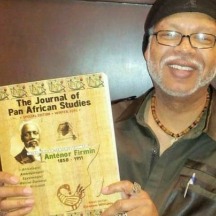Joseph Anténor Firmin (1850-1911) was an exceptionally brilliant, extraordinary, multidisciplinary Haitian scholar and statesman. He is deservingly recognized as the first anthropologist and probably Egyptologist of African descent in the diasporan world of the late nineteenth century.
Fortunately for all of humanity, Firmin courageously raised his herculean Haitian literary voice to challenge and meticulously dismantle the dangerous pillars of the race myth and race propaganda. Firmin published “The Equality of the Human Races: Positivist Anthropology” in 1885. The text is the world’s first sustained book length response to Euro-American “scientific racism,” when anthropology was just emerging as a specialized field of study.
This international school propagating the pseudo-science of biological and intellectual inferiority of African descended people has been referred to as “scientific racism.”
During this period, an international school of racial typology favoring the superiority of Caucasian’s over all people of color had begun to develop and publicly express itself in Britain by Charles Hamilton Smith (1848) and Robert Knox (1850); in France by Arthur de Gobineau (1853); in the United States by Samuel Morton (1839, 1844), Josiah Clark Nott (1854), and George Robbins Gliddon (1854); and in Germany by Karl Vogt (1863).
This international school propagating the pseudo-science of biological and intellectual inferiority of African descended people has been referred to as “scientific racism.” The anti-racist anthropologist Ashley Montague has accurately observed, “…throughout the nineteenth century hardly more than a handful of scientific voices were raised against the notion of a hierarchy of races.”
Firmin and his text are a seminal part of a long tradition of intellectual, vindicationist scholarship that seeks to re-conceptualize and reconstruct the historical and cultural position of African people’s achievements and contributions to world history and global civilizations. In my personal view, Firmin’s appraisal and assessment of the ancient classical writers and the direct connection he makes to contemporary historical figures is brilliantly formulated for the modern reader.
Joseph Anténor Firmin:
Early Intellectual Resistor to White Supremacy and Scientific Racism
Praising the Past


Firmin’s inspirational and transformational life and work can be utilized by academics and non-academics alike to dismantle and defeat the dangerous fallacies and falsifications propagated by the ideology of White racial hierarchy.
Additionally, it is both important and extremely necessary that we directly link and connect Firmin to his intellectual ancestors and antecedents who were also forcefully enslaved and exiled in the diaspora. When we examine the roots and foundations of pan-Africanist movements and African centered thinking (Africology) we must pay very close attention to Bishop Henry McNeal Turner, Edward Wilmot Blyden, Paul Cuffe, Martin R. Delaney and Robert Campbell.
Firmin, like those intellectual champions that preceded him, challenged the dominant mainstream historical narrative and boldly redefined who and what it means to be an African person whether one is born in Haiti, America, Brazil, South Africa, Ghana, or Ethiopia. We are all children of the motherland, children of the cradle of humanity and primordial civilizations.
Note: Williams is a retired Adjunct Professor of African-American History and African-American Studies at Mesa Community College, Mesa, Arizona. Routledge Press released his essay "Anténor Firmin, Pan-Africanism, and the Struggle for Race Vindication" in Reconstructing the Social Sciences and Humanities Anténor Firmin, Western Intellectual Tradition, and Black Atlantic Tradition in May 2021.
Like POH publisher Wayne Young, Williams is a graduate of Gary West Side Senior High School and also traces some of his earliest African-centered thoughts to Herman Langford, West Side History teacher.
Additionally, it is both important and extremely necessary that we directly link and connect Firmin to his intellectual ancestors and antecedents who were also forcefully enslaved and exiled in the diaspora. When we examine the roots and foundations of pan-Africanist movements and African centered thinking (Africology) we must pay very close attention to Bishop Henry McNeal Turner, Edward Wilmot Blyden, Paul Cuffe, Martin R. Delaney and Robert Campbell.
Firmin, like those intellectual champions that preceded him, challenged the dominant mainstream historical narrative and boldly redefined who and what it means to be an African person whether one is born in Haiti, America, Brazil, South Africa, Ghana, or Ethiopia. We are all children of the motherland, children of the cradle of humanity and primordial civilizations.
Note: Williams is a retired Adjunct Professor of African-American History and African-American Studies at Mesa Community College, Mesa, Arizona. Routledge Press released his essay "Anténor Firmin, Pan-Africanism, and the Struggle for Race Vindication" in Reconstructing the Social Sciences and Humanities Anténor Firmin, Western Intellectual Tradition, and Black Atlantic Tradition in May 2021.
Like POH publisher Wayne Young, Williams is a graduate of Gary West Side Senior High School and also traces some of his earliest African-centered thoughts to Herman Langford, West Side History teacher.
Advertisers | Contact Us | Events | Links | Media Kit | Our Company | Payments Pier
Press Room | Print Cover Stories Archives | Electronic Issues and Talk Radio Archives | Writer's Guidelines






